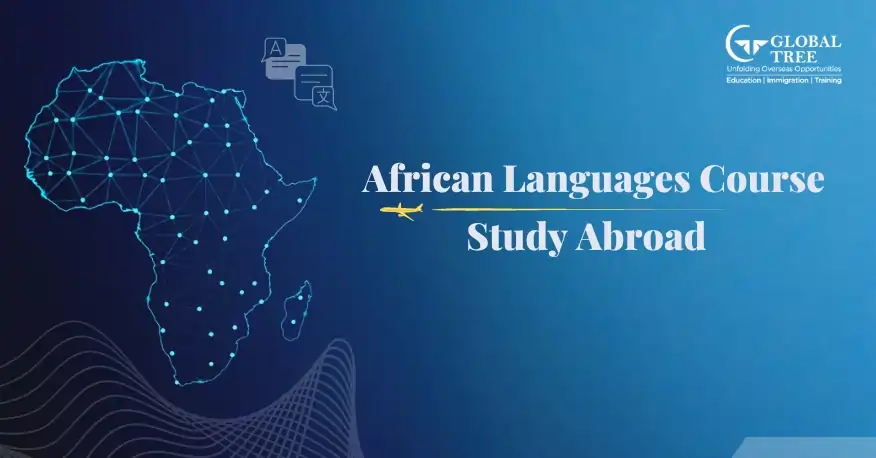All About African Languages Course to Study Abroad

Introduction
Your ability to speak, write, and read many African languages will improve with a degree in an African language. Arabic, Swahili, Twi, Yoruba, and Zulu are the African languages that are most frequently taught in these programs. Along with learning the language, you will gain knowledge of the vibrant African culture during your study. African languages, culture, society, literature, syntax, phonology, world writing in Africa, and corporate communication are all topics covered in the major.
Five important African languages are taught as part of degree programs in African languages: Swahili, Yoruba, Twi, Wolof, and Zulu. Beginner, intermediate, and advanced classes are offered in these. Students who enroll in introductory classes learn how to communicate in groups as well as how to read and write well in four to five African languages. Through readings from print media and literature, intermediate courses have an emphasis on conversational fluency and reading comprehension. Advanced courses emphasize longer literary, political, and media texts and longer discussions. Choose the Best African Languages Course & Colleges to Study Abroad.
Additionally, the course will cover topics related to African politics, history, cultures, and development. Students gain analytical skills and specialize in a chosen language during their junior and senior years.
Who is eligible to study African Languages Course Abroad?
This degree can be a suitable choice for you if you have a passion for African culture or perhaps appreciate learning new languages. As some of the languages are relatively similar and learning numerous languages at once might be difficult, you need to have a high verbal IQ. After the initial classes, learning numerous languages simultaneously might be beneficial since you'll gain a deeper understanding of the subtleties of words in different languages by contrasting and comparing them.
Before enrolling in this program, keep in mind that many colleges that teach African Languages also provide you the chance to spend a semester abroad in Africa, where you can improve your language abilities and get a taste of the local culture.
How much does it cost to study African Languages Course Abroad?
For a four-year bachelor's degree programme in African studies, the average annual tuition in Europe is 28,654 euros, and for a two-year master's program, the average annual tuition is 33,260 euros. A bachelor's degree abroad curriculum in Beijing costs between 25,000 and 35,000 RMD in tuition, and a master's degree program costs about 30,000 RMD annually. In contrast, a bachelor's degree in African languages in the US costs about $25,078 and a master's degree costs about $39,000.
What is the Future Scope of African Languages Course Abroad?
The second-largest and second-most-populous continent on earth is Africa. This, together with the rising importance given to business-friendly policies by African governments, has elevated the value of graduates with an African language degree in the labour market. The study of resources and the discovery of fresh trade routes with African nations have increased the importance of this topic.
African languages have one of the fastest employment growth rates. In recognition of Africa's growing relevance on the world stage, many nations have set aside monies to support and promote African language activities.
You can pursue a career in areas as diverse as diplomacy, education, politics, journalism, and social work with a degree in African languages. The job market for graduates with degrees in African languages is untapped because there aren't many of them, therefore graduates can anticipate high salaries.
Trending Career Options in African Languages Course Abroad
Take advantage of your knowledge or transferable abilities to explore a variety of job avenues involving African languages.
Career as a Translator
Your daily word count as an African language translator should range between 2,000 and 3,000. Working with clients, consulting specialised dictionaries, and using reference materials to discover appropriate translations of industry jargon is all part of a typical day for you. You'll convert texts from one language into another, or the other way around.
(Read more: top technology courses to study abroad)
Career as a Professor of Foreign Languages
You can utilize your specialized expertise to teach in academic departments like linguistics, philosophy, psychology, speech and communication science, or anthropology by studying African languages to help you pursue an academic career. After earning your master's or doctoral degree, you can decide to work as an African language professor.
Career as a Technical Author
Together with visual designers, user experience designers, software developers, and testers, technical writers create content. The primary responsibilities of the position include information collection, content planning, and technical document writing for manuals, whitepapers, business communication, and other forms of consumer education.
Career as a Lexicographer
For native speakers, English language learners, professionals, and bilingual speakers, lexicographers create, assemble, and edit dictionaries. In their editing task, they keep track of new words, record them, and assess the text's accuracy.
Career as a Legal Linguist
In order to assist law firms, police, and governments in solving crimes, forensic linguists perform emergency calls, suicide notes, threat communication, and language analysis on social media during court processes.


